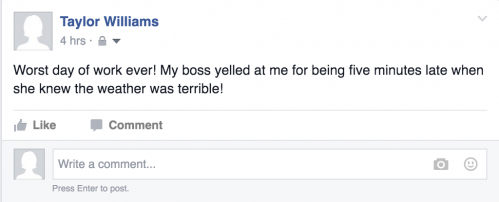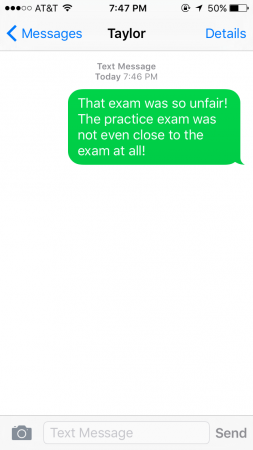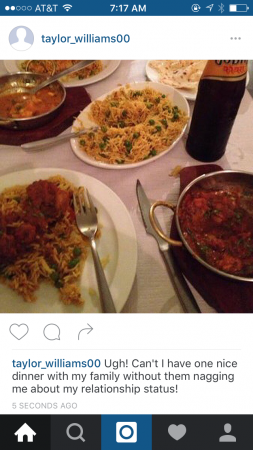How does an app change the meaning of a text?
Have you ever seen a person post an extremely angry message on Facebook? What did you think when you saw it? If you're like us, you probably thought "wow, that person must be pissed if they are willling to vent about this problem on Facebook for everyone to see!" Normally, it seems that people filter themselves before posting every thought they have onto a relatively public space like Facebook or Instagram. Would you want your grandma (you did accept your grandma's friend request, right?) or your future employer to see your angry rant about undercooked pasta at that new Italian restaurant?
But what if you took that exact same noodle rant, and instead sent it as a text to your best friend? That way you could get out all that rage in a more personal way, sharing it with only one close friend instead of your entire friends list, or the entire world. An SMS seems like a more fitting space for angry rants, as it is more private.
With these different expectations for the types of messages that are appropriate for different social media platforms, how does it affect how we interpret the message?
We hypothesize that the more public a social media platform is, the less likely one is going to use that space to post angry messages. Instead, people are more likely to post angry messages in private, like through texting apps.
To test this hypothesis, we came up with three different example messages of text. In one, the writer complains about a strict boss who just doesn't understand:
Worst day of work ever! My boss yelled at me for being five minutes late when she knew the weather was terrible!
The next is a complaint about doing poorly on an exam. Not from lack of practice, however, but because the professor's practice exam was unhelpful:
That exam was so unfair! The practice exam was not even close to the exam at all!
Finally, a text about nagging parents who are just too eager to become grandparents:
Ugh! Can't I have one nice dinner with my family without them nagging me about my relationship status!
We want to see how a person interprets these three pieces of text, and how that interpretation changes based on the social media platform it was seen on.
To do so, we conducted a study on Qualtrics. The survey-taker is first asked some demographic questions before being asked three questions, one for each piece of text. "On a scale of 1 (not angry) to 10 (the most angry): How angry do you think the person who wrote this is?" The important part is that every survey taker gets randomized questions. While everyone gets one question for each piece of text, which social media platform that text is seen in is randomized. The same text could appear as a Facebook post, an Instagram post, or an SMS message.
We predict that, because it is more unusual to see an angry rant on Facebook than through a personal SMS, people will rate the text messages seen as Facebook posts as more angry than the same text as an SMS. Likewise, Instagram is generally a place to post life highlights and positive picutres, making an angry post there unusual, leading us to expect higher anger ratings for a text seen as an Instagram post.
A total of 147 people took our survey, with 63% of them being female. 72% of the respondents were between the ages of 17-24, and 45% of respondents were not currently in school. The vast majority of participants indicated English was their native language.
The mean anger ratings for each combination of text and platform can be seen below.
So how did our hypothesis fare? We expected high anger ratings for Instagram, and the text on Instagram was seen as the most angry for 2/3 of the messages, the exception being the "family dinner" message (this may be because of the popularity of posting food-related pictures on Instagram. Maybe because it was a picture of a dinner, it seems less out of place on the platform, and doesn't seem as angry). We also predicted that a message on Facebook would be seen as more angry than on an SMS, but our results did not reflect this. Facebook was angrier than SMS for the "unfair exam" message, but it was about the same for the "late to work" one, and actually the SMS message was the most angry in the "family dinner" question (one possible interpretation: this may be because the survey taker interprets the SMS as being sent during dinner, meaning the sender must be particularly angry to rudely text while at the table.)
But even if our exact hypothesis did not end up being supported by the data, our results do show that the platform the message is seen on affects the anger interpretation of the message, even if the text is exactly the same! Language is very context-dependent, and real-time text communications are no exception. Next time you need to post something online, remember that the platform you choose will influence how people interpret your message!
Results
Late to work
Worst day of work ever! My boss yelled at me for being five minutes late when she knew the weather was terrible!


Unfair exam
That exam was so unfair! The practice exam was not even close to the exam at all!
Family dinner
Ugh! Can't I have one nice dinner with my family without them nagging me about my relationship status!
